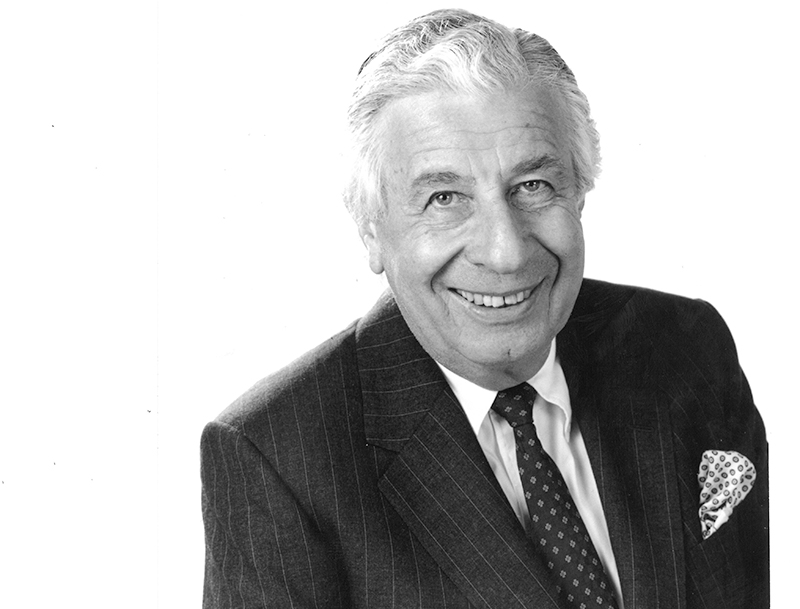
(Source: Commercial Real Estate Executive)
Jack Rudin, the patriarch of a celebrated family of New York City real estate developers, died on Sunday at age 92. The family cites pneumonia as the cause of death. A prominent business leader and an iconic, local New Yorker, Rudin forged a prolific and civic-minded career.
He is championed as a key player in the development of government and business partnerships that helped the city stave off bankruptcy in the 1970s and pave the way to revitalization. Rudin’s key idea was a simple one, but antithetical to the typical MO of real estate development – property owners would help the city refill its dwindling coffers by pre-paying taxes. An idea that seems anachronistic and counterintuitive especially in recent years when the city buoys up real estate development with tax breaks.
Rudin was also known for having a civic consciousness that extended beyond financial and real estate concerns. He founded the Association for a Better New York, which encourages and promotes New York civic pride across the city.
About Rudin Management
Rudin Management, which is currently headed by Jack’s son, Eric Rudin, owns and operates 15 million square feet of commercial and residential property. Sixteen of their buildings are commercial and 20 are apartment buildings. The total valuation of their properties exceeds $20B. Buildings in Rudin Management’s portfolio include 345 Park Avenue (commercial), 1 Battery Park (commercial), 3 Times Square (leased by the Thomson Reuters), 215 East 68th Street (residential) and 211 East 70th Street (residential) among others.
Jack ran the business with his brother, Lewis, who died in 2001. The brothers divided operating responsibilities, with Lewis handling the finances and Jack managing construction. According to the family, Jack renounced terms like “landlord” and “developer,” seeing himself as an “owner” and “builder.” Today the company employees over 800 people.
Rudin and the New York City Marathon
In 1976, Borough President Percy Sutton was looking for ways to boost civic engagement in advance of the national biennial. Sutton and a group of New York City business leaders approached Fred Lebow, president of the New York Road Runners Club, and proposed expanding the course of the New York City Marathon (then confined to four loops of Central Park) across the five boroughs. Lebow scoffed at the price (estimated at $20K, about $85K in today’s terms), but Rudin Management offered to front $25K to cover the operating costs of the race. To this day, the Rudins are a major sponsor of the marathon and the winning trophy still bears the name of Rudin’s grandfather, Sam.
The Early Life of Jack Rudin
Born on June 28, 1924, Jacob Rudin (he later legally changed his name to Jack) spent his infancy and early years in the Throgs Neck section of the Bronx. His grandfather had immigrated to the United States from Poland at the turn of the century and was quick to buy property in his new homeland. The first Rudin property was on 54th Street, a plot of land the family held for years and eventually developed into a 32-story office tower.
In 1924, Jack’s father founded the Rudin real estate company. Years later, he moved with his wife and two boys from the Bronx to Manhattan where Jack attended high school and a couple years of college before enlisting in the Army in 1942. When he returned home in 1946, he had been honored with a bronze star and went on to join the family real estate business.
His career involved many partnerships with New York City mayors including, Lindsey, Dinkins and Koch among others. He sat on the board of the Memorial Sloan Kettering Cancer Center, the American Museum of Natural History, the Jewish Theological Seminary, Jazz at Lincoln Center among other important local institutions. He is survived by his wife, three children, two stepchildren and eight grandchildren.
According to the New York Times obituary, “Above all, Mr. Rudin was a builder, and a utilitarian one. Defending a proliferation of ascetic white-brick facades derided by architecture critics, he declared that “usability comes first, layout is everything” and added: “We are manufacturers of apartment buildings. We have to price apartments so they will rent. What good is having an architectural monument that doesn’t rent?”” Love ’em or hate ’em, those white brick apartment buildings are a fixture in Murray Hill, UES and much of Manhattan. As is Jack Rudin in the city’s skyline and civic spirit.
His funeral was held today at Central Synagogue on 55th Street and Park Avenue.